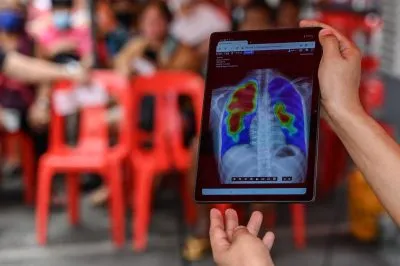Africa and technology: two terms that have long been wrongly held as antithetical concepts. Africa’s technological revolution, which has seen mobile uptake grow more quickly than anywhere else in the world and internet connectivity increase at a bracing pace, has done much to correct opinions. Now it seems that it is the banking sector’s turn to prove that Africa can be ahead, as well as up to date, with the technological times. Report by Sherelle Jacobs.
Banks and other financial service providers across the continent are currently rolling out an impressive range of technology-based services in a bid to lure more customers, many of whom are the unbanked poor and lower-middle classes. From ATMs and security systems to mobile money transfers and mobile wallets, an array of cutting-edge applications are not only proving lucrative for service providers and suppliers operating in Africa but transforming daily life for millions of Africans.
Gustav Vermaas, Head Payments, Standard Bank Africa, says, “Economic growth across the continent has led to the emergence of an African middle class made up of a modern and younger generation of Africans endowed with a strong entrepreneurship spirit. This middle class has access to technology and catering for their needs require African banks to diversify their offerings and to be able to provide technology-based services.”
An ever-increasing catalogue of firms, from banks and mobile phone operators to ATM suppliers have thus scrambled to gain a slice of the profit pie, and competition has proved fierce as firms seek to stay a step ahead of their counterparts. Expansion, innovation and competition therefore strongly characterise the sector and new, improved models of various technology-based products and services are being expanded and improved at a rate that is almost too quick to track.
This is especially clear in the ATM sector. The explosion of ATMs across the continent is continuing, especially in the continent’s fastest-growing countries where banking penetration is low. In an ironic twist, Africa’s economic ‘backwardness’ is driving the market as the demand for ATMs in rural areas is high. In Ethiopia, the country’s Commercial Bank (CBE) recently announced its intention to invest $5.8m in opening hundreds more cash machines, which will triple the number in the country.
And in Rwanda, where banking penetration is still marginal, the opportunities to reach out to more customers and competition between banks is driving the expansion of ATMs; in February, the Bank of Kigali announced its intention to have 60 ATMs across the country under its belt by the middle of 2012, including in rural areas. This was reportedly partly in response to new competition from Kenya-based Equity Bank, as it has entered the Rwandan market strongly.
Enhancing ATM functions
Yet product proliferation is not the only trend that currently defines the African ATM market. Crucially, innovation in the development of ATM models is also intensifying. Part of the focus has been on enhancing functionality for users, and banks in the bigger African economies like South Africa have largely been the pioneers.
Absa, one of the four leading banks in South Africa, is a case in point. It is planning to update its entire network of ATMs as part of an ambitious three-year overhaul project. Absa reportedly hopes that the endeavour will markedly improve its range of ATM services.
“The new ATM interfaces we are providing are more intuitive. The design is clean, and helpful animations assist customers with their transactions. Transactions are faster. Security is enhanced, particularly when it comes to card skimming,” said Christo Vrey, head of Absa’s Digital Banking Services.
“Our ATMs will no longer be simply for drawing cash, but will also become self-service tools that give Absa customers the ability to pay bills and request documents that they would normally only be able to access in a branch,” he added.
In order to compete with larger banks, independent ATM companies, which provide ATMs to retailers, are also striving to ensure they offer cutting-edge services. ATM Solutions, the biggest independent retail ATM supplier in South Africa, offers a strong example. It recently appointed Fiserv, a leading technology solutions company, to provide its ATMs with new software, which it says will enable the company to manage the availability of its services better and operate more efficiently and profitably.
Adapting security for Africa
Another fast-expanding area of banking technology is in security systems. Financial crime has reached worrying levels on the continent.
The PricewaterCoopers (PwC) Global Economic Crime survey from 2011 found that 60% of respondents in South Africa and 66% of respondents in Kenya reported experiences of cyber crime. A report published by Deloitte Kenya last year also revealed that Kenyan banks lost just under Sh3bn ($366m) in 2010 from fraud.
As a result, interest in new cutting-edge security systems has intensified. In Kenya, Usalama Innovative Systems, which has been ranked amongst the top East African technology companies for innovation, has been hard at work designing cutting-edge security software for the Kenyan market. Its solution is a two-pin system for cash withdrawals, with the first PIN code only enabling access to a limited amount of cash.
FirstBank Nigeria, which was the 2011 winner of African Banker’s Most Innovative Bank in Africa award, caused a flurry of excitement when, last year, it launched Nigeria’s first biometric ATM, which identifies customers via body scanning. As well as preventing bank cards from being used fraudulently, the ATM also makes usage more straightforward for those who find traditional withdrawals difficult, such as the illiterate and elderly.
Money transfer made easy
It is also no surprise that money transfer is another key area of the banking sector in which expansion and innovation is escalating. With a large number of the African middle class working abroad, remittances constitute the second-largest source of income after FDI for Africa, say experts.
“Today there are more mobile phone users on the continent than there are bank accounts, branches, and ATMs; and the vast majority of these mobile phone users are either unbanked or underbanked,” says Standard Bank’s Gustav Vermaas. “They typically run Africa’s informal economy, where vast amounts of money change hands but escape the formal economy. Most of these individuals have no access to financial services but would like to. This explains the huge potential of mobile banking and why, first mobile operators and now banks are embracing the platform.”
Yet the potential for expansion and further innovation is still huge, as developments over the last few months have proved. Visa, the world’s biggest international payments company, has announced that it will soon launch a mobile money transfer service specifically tailored to the African market. “Mobile money is very key for us. This is our key growth area. This is seen as a move by Visa to tap into the large mobile money transfer market, having the advantage of being an international company,” said Victor Ndlovu, the country manager for Visa in East and Central Africa.
Meanwhile, in South Africa, Absa is also currently trialling a mobile transfer programme, which could potentially target around 40m users.
Moreover, the industry could soon explode in Africa’s most populous country Nigeria, where mobile transfers have yet to take off even though the number of mobile subscribers is edging towards 100m. Banking regulators have just granted final approval to 11 firms, which permits them to launch mobile money services for the country’s market.
There are already hints of activity: Guaranty Trust Bank, in partnership with MTN Nigeria, launched a mobile banking service in December. In the same month, Globacom, a telecommunications company, in conjunction with two Nigerian Banks, also launched a mobile service.
Mobile wallets are basic electronic bank accounts, which can be accessed using a mobile phone and, as well as money transfer, services include air-time purchases and the ability to make utility payments. They therefore provide Africans with the power to carry out a wide range of everyday actions without having to step into a bank.
That the mobile banking revolution recently prompted American media to question why the service has not taken off in the US is a revealing hint of the tectonic shifts, which Africa’s banking sector, and arguably Africa as a whole, is currently experiencing.
Innovation looks to be the operative word for the industry for years to come. Both customers and those in the industry in the developed world should take note. They may well find the next big thing hitting Africa first.
Want to continue reading? Subscribe today.
You've read all your free articles for this month! Subscribe now to enjoy full access to our content.
Digital Monthly
£8.00 / month
Receive full unlimited access to our articles, opinions, podcasts and more.
Digital Yearly
£70.00 / year
Our best value offer - save £26 and gain access to all of our digital content for an entire year!

 Sign in with Google
Sign in with Google 




